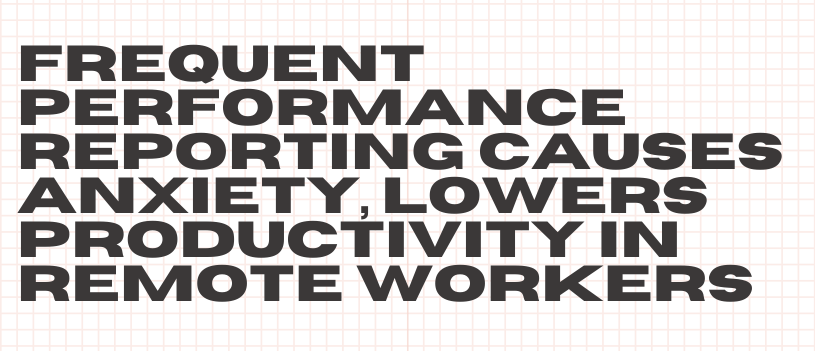One of the biggest changes that we have seen during the COVID-19 pandemic is the large shift from working in person to working remotely from home. Somewhere around 20% of adults in the US are working outside of an office location.
Something that comes along with working remotely is that employees are no longer working with their supervisors in the same building. This begs the question, “How can you regularly check your employees’ progress and that they are continuing to do their work”? Naturally you might be inclined to ask for more performance reports, but a recent survey by The Accounting Review might prompt you to do otherwise.
The Accounting Review begins by explaining the understanding of wanting to require frequent performance reporting since the start of remote work for your staff. They understand that this can be an effective way to know that your employees are meeting goals and actually working. However, it also urges managers not to implement this policy.
New research has proven that high frequency reporting actually has a negative impact on employee performance as well as motivation. It shows that when people know that their tasks are going to be evaluated more often, it causes avoidance because they do not want negative judgements on their work or competence.
Laura W. Wang from the University of Illinois co-authored the study with colleagues Gary W. Hecht and Jessen L. Hobson and conducted their research before COVID-19 actually began. However, they think that their research and findings should be taken into consideration by employers now more than ever. With so much work having moved to being remote and some likely remaining that way, many managers are going to be tempted to increase checks on employee performance reporting and Wang strongly urges against this too frequently.
In 2018 a new study about mandating quarterly reporting was done in Accounting Review and found that this directly caused a reduction in capital investment. Similarly, shifting this to a perspective of individual employees shows that they adopt a short term view that leads to potential loss, negative judgements, undesirable consequences and therefore causes an avoidance culture and affects work performance giving the opposite of the original desired effect.
This new study was based on a behavioral experiment of 87 undergraduate business students. They volunteered to take an online critical reasoning test that was about 30 minutes of multiple-choice questions. While the students took the test, they could monitor how long they had been testing as well as the number of correct answers. However, there were 2 important differences in instructions that the students were given:
- About half of the students were told to report their test scores in-person every 10 minutes to a test administrator. The rest of the students were told to only report their score one time once the test was completed. To report their scores, they had to raise their hand for the test administrator to check their screen and write down how many answers they had gotten correct with no feedback given.
- After that, they further divided the groups into what they said was the purpose of the test. Half of the students were told it was to evaluate their critical reasoning skills which is important for a career in business (the evaluation group). The others were told that it was simply to assess the quality of the questions (the non-evaluation group).
In the non-evaluation group there was not much of a difference in scores of students that had to report their results every 10 minutes and those who did not. This shows that frequent reporting is not just mechanical. However, in the evaluation group the contrast between students who had to report more often versus one time reports was much more significant. It showed that students that only had to report once, averaged about 30% more correct answers than those who had to report multiple times.
The study also had these volunteers take a post-test analysis. The evaluation group definitely showed apprehension and avoidance and said things such as, ” ‘When I worked on the critical reasoning questions, I worried about performing worse than other people in the study’ and Í felt apprehensive about being evaluated for my critical reasoning skills.’ “
In conclusion, frequent reporting definitely induced more anxiety and impacted performance ability as well as confidence. Wang says that these results were particularly interesting for two reasons:
- Most of the volunteers did not know the administrator.
- The consequences and appearance of this test were virtually irrelevant.
She believes that in a real-life scenario that the results would be much stronger with higher consequences and being judged by someone they likely know and respect.
This study showed that while employers might be even more likely to over-monitor employees on projects that are cognitively challenging, that managers should be advised to avoid doing so.
Managing a remote team isn’t always easy, but requesting frequent performance reporting doesn’t seem to be the answer to your peace of mind. If you need assistance with determining what you should require, be sure to contact a human resource professional or employment attorney. If you need a referral to someone we know and trust, contact us at 310-534-5577 or [email protected].
Find more information from the original article here:
